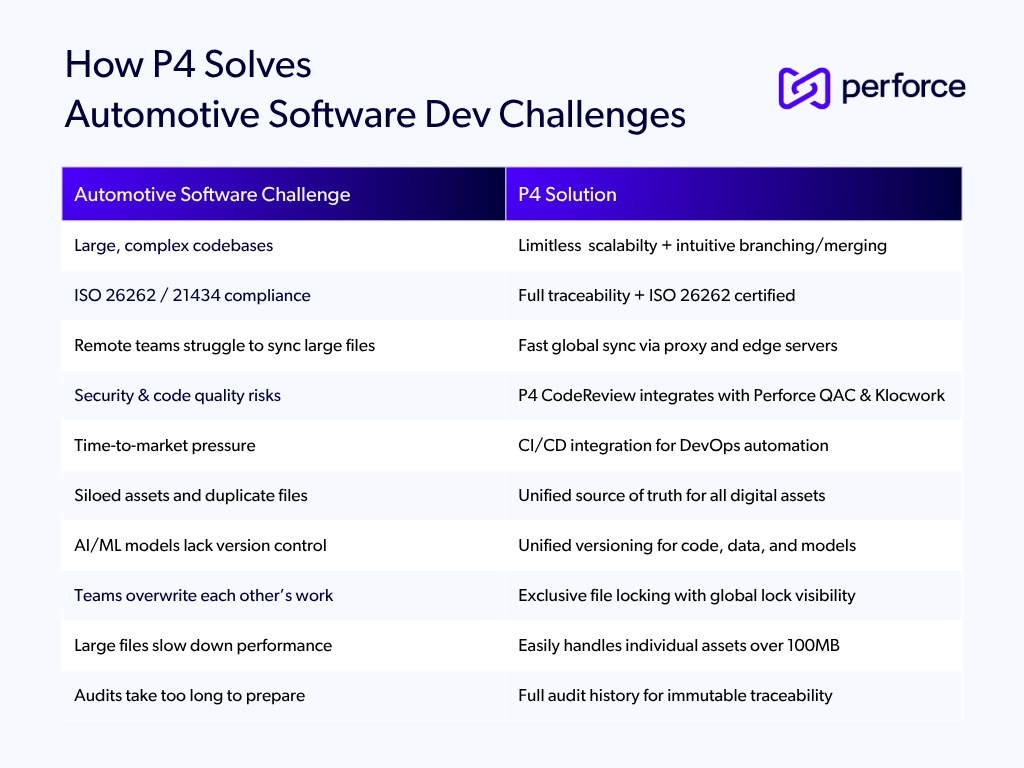Blog
July 14, 2025
Inside the 2025 Automotive Software Report: What Holds Teams Back?
Data Management,
Version Control,
DevOps,
Security & Compliance,
Software Quality
The Perforce 2025 State of Automotive Software Development Report revealed that automotive companies are most concerned with quality, safety, and security. These concerns apply across the automotive software development cycle and include:
- Managing complex codebases
- Meeting strict safety standards like ISO 26262 and ISO/SAE 21434
- Incorporating AI tools
- Mitigating cybersecurity threats
In this article, we’ll explore how Perforce P4 data management aligns with key findings from the automotive report and why it’s the optimal platform for automotive companies navigating complex development challenges around data, traceability, and collaboration.
The 5 Biggest Challenges in Automotive Software Development
The 2025 State of Automotive Software Development Report highlights several concerns for automotive development teams:
- Code Quality: 29% of respondents said that maintaining high-quality code is their top priority. Large, complex codebases and exhaustive testing requirements further complicate this effort.
- Safety and Compliance: With the rise of electric, connected, and autonomous vehicles, meeting safety standards like ISO 26262 and new AI/ML-specific guidelines such as ISO/DPAS 8800 is increasingly vital.
- Security: 22% of respondents cited security as a primary concern, driven by the need to comply with ISO/SAE 21434 as well as the need to safeguard software from cybersecurity threats.
- Global Collaboration: With over 50% of respondents working in hybrid or remote positions, distributed teams are now standard in the industry. This makes managing performance and scalability increasingly difficult. Furthermore, companies must protect their valuable IP across their distributed teams, without hampering collaboration.
Maintaining Industry Competitiveness: 58% of companies worry about succeeding in a highly competitive industry. This highlights the need for efficient DevOps workflows that accelerate development while maintaining product integrity throughout the lifecycle.
To meet these automotive industry challenges, P4 offers a comprehensive solution with tailored capabilities to meet the needs of evolving automotive industry software development teams. Let’s break down each challenge and how P4 solves it.
1. Managing Complex Codebases and Ensuring Quality
Maintaining quality is the highest priority for automotive development teams building increasingly complex software systems. However, the surge in AI/ML, plus electronics and mechanical design, yields massive file sizes for designs, models, and simulations.
With 21% of respondents reporting difficulty in enforcing coding best practices, managing parallel development and intricate merges is a delicate balancing act. Team leaders need a platform that manages the large files and complex branching that legacy systems and Git-based systems often struggle with.
The P4 Advantage:
- Scalable Architecture: P4 is designed to seamlessly manage massive codebases. Teams can organize and version millions of files including source code and large binary assets like CAD designs and AI/ML models.
- Streamlined Branching and Merging: P4 excels for parallel development across complex global branches. Perforce Streams is a built-in feature that intuitively helps developers visualize code changes, track progress, and integrate work for faster and more productive project sprints.
- Seamless Integration with Testing Pipelines: P4’s integration with CI/CD tools, including Jenkins, GitLab, and Perforce Puppet, ensures continuous testing at every stage of the development lifecycle. You’ll be able to shift-left more efficiently and catch errors sooner.
With P4, automotive companies can boost efficiency without compromising quality, even as your codebase grows in size and complexity with the development of advanced vehicle systems (AVSs).
2. Meeting Compliance Requirements with Full Traceability
Functional safety compliance is crucial in the automotive world. Emerging standards for AI safety, advanced driver assistance systems (ADAS), and cybersecurity add further complexity to the mix. Keeping up with safe coding standards for life-critical automotive software is an increasingly demanding job.
46% of survey respondents expressed difficulty in complying with ISO 26262, with larger organizations being the most likely to struggle. To ensure compliance, developers need versatile automotive software design tools that offer full traceability, version documentation, and built-in compliance features.
The P4 Advantage:
- ISO 26262 Certification: Perforce P4 is the only ISO 26262- certified version control solution available. Build projects on a foundation that is compliant with the auto industry’s most important safety standard.
- Traceability and Auditability: P4 enables detailed version history tracking, including who made a change, why, and when. Teams can create and maintain safety baselines through granular change tracking.
- Integration with Static Analysis Tools: Paired with Perforce QAC and Klocwork through P4 CodeReview, P4 helps identify code vulnerabilities and enforces adherence to coding standards MISRA, CERT) critical for safety and security compliance.
P4 provides a single source of truth, giving you accurate and accessible compliance documentation for audits and safety assessments.
3. Strengthening Security
With connected vehicles, over the air (OTA) updates, and increasing reliance on AI, security is of utmost importance for developers and vehicle owners alike. Cybersecurity standards like ISO/SAE 21434 require development teams to adopt secure practices from day one.
With 46% of survey respondents stating they had been impacted by code vulnerabilities one or more times, it’s clear that meeting cybersecurity standards in automotive software is more challenging than ever. To avoid costly breaches, choose tools that allow your teams to work safely and securely, no matter where they’re located.
The P4 Advantage:
Customizable Access Controls: P4 allows for precise user and group-level access permissions to ensure that sensitive files are only accessible to authorized developers.
- Secure Workflows: Integration with Perforce static analysis tools ensures coding practices are secure by design.
- Change Validation: P4 makes tracking changes simple, so teams can identify potential vulnerabilities caused by unauthorized or untested modifications.
- Audit Trails: See who changed what and when they did it. You have full audit capabilities to quickly search through your version history.
P4 fortifies the software development lifecycle so that teams can confidently preempt cyberattacks and safeguard their end products.
4. Enhancing Productivity for Distributed Teams
Modern automotive development is shaped by global collaboration and remote work. Yet, distributed teams face significant challenges working with large binary files and systems at scale.
The biggest team productivity concern expressed by those surveyed (32%) was the need to manage various assets across software teams in parallel development. Additionally, 25% said they struggled to meet the performance and scalability demands of distributed developers and remote teams working with large, complex assets. Today’s automotive leaders need secure tools that expedite collaboration so that projects stay on schedule.
The P4 Advantage:
- High-Performance Global Collaboration: P4’s architecture is built to support geographically dispersed teams handling massive assets and remote repositories.
- Built-in File Locking: P4 offers critical file-locking capabilities for binary files to minimize the risks of merge conflicts that commonly occur with large assets such as CAD files.
- Fast Sync Times: Edge servers and proxies cache files locally to reduce download times and prevent developer downtime. Smart syncing allows you to send only what’s changed vs the entire file.
Whether working with teams across the globe or managing concurrent file edits, P4 keeps your teams aligned and productive.
5. Powering Modern Automotive DevOps Workflows
As the automotive industry moves toward faster release cycles, software-defined vehicles, and continuous innovation, the need for mature, end-to-end DevOps pipelines is more urgent than ever.
Over two-thirds of respondents now test earlier in the development cycle to meet growing time-to-market pressure. To stay competitive, teams must build efficient, secure, and traceable DevOps pipelines.
The P4 Advantage:
- Integrated DevOps Pipelines: P4 runs seamlessly with leading CI/CD and test automation tools. Teams can run continuous integration and validation and automate builds and deployments within a single management system.
- Shift-Left Testing and Quality Enforcement: Reduce bugs, shorten cycles, and improve quality by versioning all test scripts, test data, models, and documentation. You can easily roll back historical states and codebase to catch defects before they cascade into bigger issues.
- Metrics and Governance: Preserve project baselines and monitor activity granularly for a fully compliant, immutable history. Prepare for governance and compliance reviews via auditable logs and dashboards.
Perforce empowers DevOps workflows for large, complex automotive projects without sacrificing security or efficiency.
Empower Your Automotive Design Team with P4 Today
As illustrated in the 2025 Automotive Software Development Report, the evolving landscape demands robust, scalable, and compliant automotive DevOps tools that keep teams productive. P4 is the only ISO 26262 solution to tackle industry challenges while driving scalable innovation. From fast global collaboration to seamless CI/CD integration, Perforce P4 is a high-value investment for enterprises looking to manage large data sets and exceed today’s automotive software standards.
Download the 2025 report to get the full set of insights.
Read our eBook: Upshift Automotive Development to Overtake the Competition


